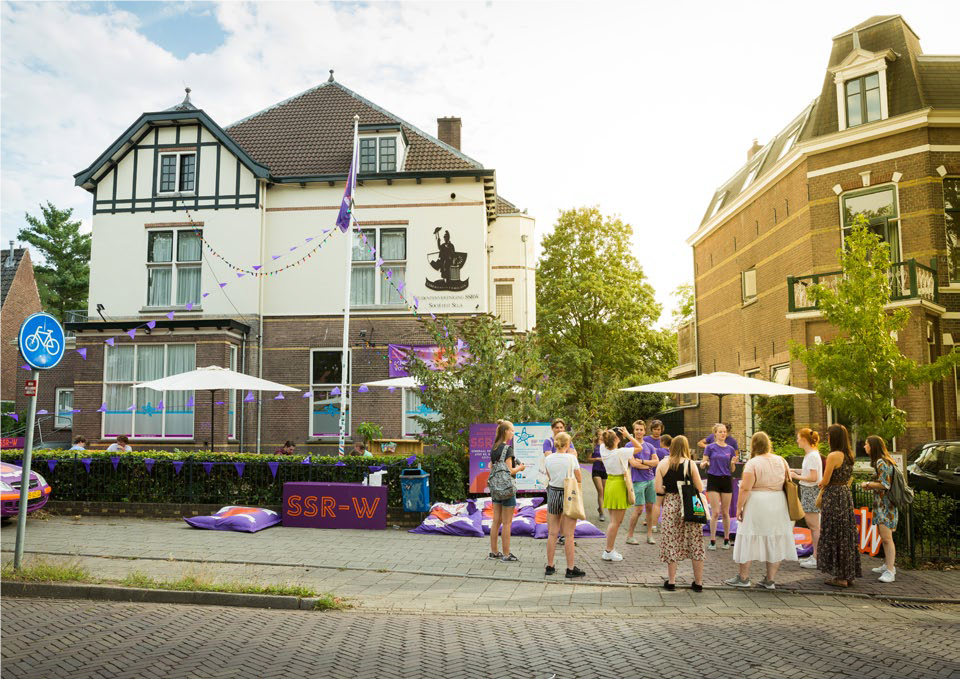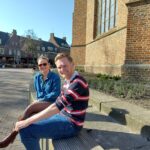Most student societies get a new board in the summer, so they can prepare for the AID and the introduction period in relative peace. During these weeks, board members get used to the job, a kind of warming up for their board year. That was the case at Ceres, where Marloes Rietveld took over as chair in July. Only, thanks to the coronavirus crisis, there was no question of a gentle warming-up period. ‘Straightaway, I was the contact person for the safety region, the university and the municipal council. That is a lot, all at the same time.’
Long-term plans could be put on ice: running a student society is crisis management nowadays. ‘I ask a lot of people for advice, such as former board members and people from our advisory body. We have regular phone calls. My advisers said recently: “I don’t know either, I reckon you know more about it now.” When I’ve finished, if there’s another pandemic, I’ll be the expert. Then they can call me for advice.’
Nothing is certain
The uncertainty of the coronavirus crisis makes it difficult to look at the long term, says Emiel Dijkstra, the new chair of KSV Franciscus. ‘You have to adapt constantly because the situation changes all the time. Take the AID. We have a committee that has been working hard from period six of the previous academic year to prepare for it. First, there was going to be a normal AID. Then it got split into two AIDs because of the coronavirus measures. Then came one of Rutte’s press conferences and the whole AID was called off. Later, it was allowed again, but on the evening before the AID it still wasn’t completely clear what student societies were and were not allowed to do. In short, nothing is certain and at any moment, new information can come which means all the plans have to be adjusted. And then they have to be approved by the safety region and the municipality.’
‘Look, we totally understand that everything has to be coronavirus-proof,’ adds Dijkstra. ‘But it does make it very challenging for the boards. On the other hand, you learn a lot from it of course. You can’t just pull out an old blueprint; now it is real management.’
Puzzling over space
With 291 new students enrolling, Franciscus is the most popular society in terms of enrolments for the second year in a row. ‘It’s going to be a real challenge to get to know each other. Because of the coronavirus measures, we can’t all be in the building at the same time, but if things get more normal later, there’s enough space for us all.’ In the first and second periods, first- and second-years will get priority in the Franciscus building. ‘You have consider the choice between existing members and first-years. In the end, the more important consideration is that the first-years still need to meet people and make friends. There is room for the rest of the members, but it is more limited to things like smallscale activities and drinks parties.’
You can’t just pull out an old blueprint
At SSR-W student society too, the board will be puzzling over space in the age of physical distancing. The society broke its enrolment record this year (262, twice as many as last year). ‘Really cool,’ thinks chair Bram Duurland, but ‘It is also very overwhelming and it brings lots of new challenges with it.’ While new members can usually be found at the clubhouse every day during the first few weeks of the year, that will have to be done in shifts this year. ‘And you also want the new members to get to know the existing members. That is important for integration. We’ve got to find a solution to that.’
Longer opening times
During the AID, 216 members signed up at Ceres. The clubhouse currently has room for about 100 people. ‘So instead of three or four days, we are now open five days a week,’ says Rietveld. ‘You have to be able to offer members a place to come to. In any case, we shall reserve two days a week for the first-years. If we divide them into different groups over two days, they can all come here once a week. This “reservation” will apply to the first period and maybe the second. After that we want to get the different years mingling, because that is one of the charms of a society.’
There is no shortage of creativity among the new board members during their baptism by fire. At Franciscus, they are looking into whether the food can be prepared faster so that more people can come and eat in several sittings. ‘It is constant management,’ says chair Dijkstra. ‘We want new members to have just as nice a start as we had. That’s difficult, but we are doing our best.’ There is one big advantage to the crisis situation, says Ceres’s Rietveld. ‘In the end, you do a board year in order to learn. I had never expected to learn so much in such a short time.’

 Student society SSR-W holds a Covid-proof informative event for first-years during the AID. Photo: Anna den Hartog
Student society SSR-W holds a Covid-proof informative event for first-years during the AID. Photo: Anna den Hartog 

